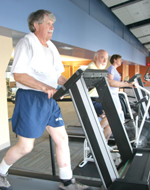|
Heart
patients who exercise to help recover from surgery and former patients
who seek to maintain better health have access to a bigger, better MUSC
Cardiac Rehabilitation (CR) facility.
Previously located in the Gazes Cardiac Research Institute, the
program was moved to its new home in April, second level of the
Bee Street parking garage (Bee and Courtenay streets). The new facility
is nearly triple the space previously used, and features a large cardio
area, adult locker rooms with showers, exam rooms, and meeting space.
Workout equipment includes recumbent cycling machines, elliptical
trainers, treadmills, stationary bikes, free weights, balance balls,
and resistance bands. A new telemetry system also allows staff to
monitor up to 12 patients at once during workouts.
Patients can benefit from programs designed to help meet individual
patient needs. Patients typically participate in six- to -12-week
programs, complete an entry-level stress test, and work with a cardiac
rehab team that includes three rehab nurses, an exercise physiologist,
nutritionist, counselor, rehab physician and other specialists.
 Frank
Peters works out on the treadmill at the Cardiac Rehabilitation
facility. MUSC Cardiac Rehab program was nationally certified in 2003
by the American Association of Cardiovascular and Pulmonary
Rehabilitation. Frank
Peters works out on the treadmill at the Cardiac Rehabilitation
facility. MUSC Cardiac Rehab program was nationally certified in 2003
by the American Association of Cardiovascular and Pulmonary
Rehabilitation.
For
Frank Peters, the regular exercise and fitness program has equated to
an added level of life-saving therapy. In 2006, Peters was diagnosed
and treated for hypercholesterolemia (high cholesterol). He changed his
diet, better managed his medications, and was referred to MUSC Cardiac
Rehab as a primary patient for supervised exercise. Three years later,
Peters continues his weekly exercise regimen through the CR’s
maintenance program. He also has made friends and enjoyed the
camaraderie and support of the cardiac rehab team along with other
patients.
“Cardiac rehab provides a firm foundation for any recovering patient
who needs a transition to exercise and physical activity under medical
supervision and a professionally-staffed environment,” said Mark Clair,
an exercise physiologist and program director.
The new facility provides rehabilitation expertise for South Carolina’s
unique full-service heart and vascular center in Ashley River
Tower. The program supports a variety of patients diagnosed with heart
disease and other heart conditions, including patients with congestive
heart failure, stable angina, valve surgery/mitral valve plasty, heart
transplant and surgery patients. Because of its advanced protocol, the
facility is approved to accept patients recovering from gastric bypass
surgery, peripheral vascular disease and pulmonary rehab patients.
Friday, June 12, 2009
|



